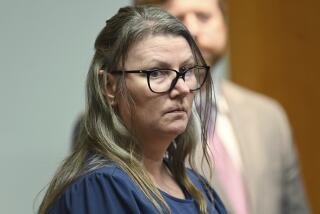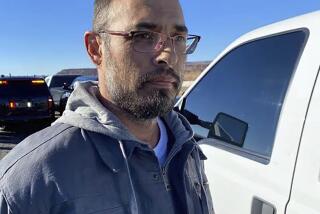Campaign mounts against mentioning Colorado shooting suspect’s name
AURORA, Colo. — Facing an audience of thousands gathered to remember victims of the deadly theater shooting here, Colorado Gov. John Hickenlooper made a strategic choice: He didn’t mention the suspect’s name.
“In my house, we’re just going to call him ‘suspect A,’” Hickenlooper said.
The crowd burst into applause, cheering the governor’s effort to join a growing campaign bent on redirecting public attention from the alleged shooter to those who were wounded and killed.
PHOTOS: ‘Dark Knight Rises’ shooting
Some experts on mass shootings laud the effort and have even joined in, saying such killers — think Dylan Klebold at Columbine andSeung-Hui Cho at Virginia Tech — often hunger for notoriety.
“They want desperately to go down in infamy. Too often, we give them exactly what they crave,” said Jack Levin, a sociology and criminology professor at Northeastern University who has tried not to name suspect James E. Holmesin interviews. Levin recalled interviewing Charles Manson, who called himself the most famous person in human history. “The sad fact is, that’s only the slightest exaggeration.”
The campaign against mentioning Holmes by name was started by the brother of one of the victims, 24-year-old Jessica Ghawi.
In the aftermath of the shooting, Jordan Ghawi, 26, of San Antonio became frustrated by how much of the news coverage focused on the 24-year-old Holmes.
“Let us remember the names of the victims and not the name of the coward who committed this act,” Ghawi tweeted Friday afternoon.
The tweet went viral. When some Twitter followers noticed Holmes’ name trending on Twitter — something Ghawi said bothered his mother — they started a campaign to promote Jessica’s name instead.
On Sunday, Ghawi met with President Obama at an Aurora hospital, where the president was visiting victims and their families. Ghawi made his pitch to the president, and when Obama addressed the tragedy as he left the hospital, he did not say Holmes’ name.
“It meant everything. This man is probably the loudest voice in the world.” Ghawi said, “I’m just hoping we can hold the media to the same level of accountability.”
Not long after the president’s remarks, Hickenlooper made his reference to “suspect A” at the Sunday evening vigil.
“I love what the governor said,” said Jacqueline Lader, who survived the shooting with her husband, Don, and a friend. “This individual did this for fame. Every mass shooter has done it for fame, and Gov. Hickenlooper said, ‘I’m not going to say his name.’”
“He was a coward,” her husband interjected. “He was studying to be a neuroscientist. There were many things he could have done. Instead, he took the easy way to make his name known.”
Ghawi noticed that when Fox News host Mike Huckabee showed some documents concerning Holmes on his show, the name was blacked out.
Ghawi said CNN’sAnderson Cooper assured him he would try to minimize use of the suspect’s name. On Monday, Cooper tweeted, “I have no intention of saying #AuroraShooting suspect’s name tonight. Don’t want to give him more attention than needed.”
In a televised interview later Monday, Tom Teves, the father of shooting victim Alexander Teves, 24, challenged Cooper and other reporters to go a step further and ban the name the way some media refuse to show streakers at public events.
“I would like to see CNN come out with a policy that said, ‘Moving forward, we’re not going to talk about the gunman. What we’re going to say is, a coward walked into a movie theater and started shooting people. He’s apprehended. The coward’s in jail,’ ” Teves said, suggesting people could boycott those who still mentioned Holmes by name.
Mary Muscari, an associate professor of forensic nursing who studied mass killings and teaches at Binghamton University in New York and Regis University in Denver, said she liked the idea of refusing to give suspects in mass killings the attention they crave. But she also said she understood why attention focuses on killers, because “people want to put a face to evil.”
Levin noted that most mass killers target coworkers or classmates. Indiscriminate, public shootings are more rare, he said, about 16% of all mass shootings.
“The dramatic nature of the attack makes me believe he was trying to maximize not only the body count, but the publicity,” Levin said of the Colorado gunman.
Mass killers often want to outdo previous killers. Cho, the Virginia Tech shooter, even paused during his rampage to mail photos of himself to NBC.
Keeping Holmes’ name out of news accounts will not be easy.
Dave Perry, editor of the Aurora Sentinel, defended the paper’s use of Holmes’ name in a Tuesday column:
“There’s a name for catastrophe in Aurora. It’s James Eagan Holmes. It’s not, ‘The Suspect,’ ‘The Shooter,’ ‘Suspect A,’ or ‘He Who Shall Not Be Named,’ as a growing number of people are insisting.... Every person who is clamoring to strike his photo from news coverage of the tragedy couldn’t take their eyes off his glowing-orange weirdness as he sat there in court like a bobble-headed troll doll.”
Dana Coffield, city editor at the Denver Post, has fielded calls from readers upset about the paper giving Holmes attention, including a woman who called Tuesday to say she was considering canceling her subscription after 50 years.
Coffield remembers making an effort to focus on victims after the 1999 shootings at nearby Columbine High School when she was at the Rocky Mountain News. That was easier, she said, because the shooters were dead.
“We are working very hard to balance our coverage in the way we place the stories in the paper, making sure we don’t place a photo of [Holmes] next to a victim’s story,” Coffield said. But, she added, “the reality is we just cannot not mention someone’s name because it is offensive to the community.”
Robert Thompson, a professor of popular culture at Syracuse University, said the effort not to identify the shooting suspect by name violates basic principles of journalism.
“A name attaches a sense of responsibility. I think that’s important information,” Thompson said.
At a minimum, Levin said, Jordan Ghawi and other victims’ relatives may succeed in raising public awareness about how society views and describes mass killers.
Ghawi said the process had also raised his awareness about past tragedies and the importance of remembering the dead.
“You can probably ask people if they remember the shooters in Columbine, and they’d say Dylan Klebold andEric Harris,but I can’t remember a single victim,” he said. “I’m trying to learn that.”
molly.hennessy-fiske@latimes.com
Times staff writer Alexandra Zavis contributed to this report.
More to Read
Start your day right
Sign up for Essential California for news, features and recommendations from the L.A. Times and beyond in your inbox six days a week.
You may occasionally receive promotional content from the Los Angeles Times.







